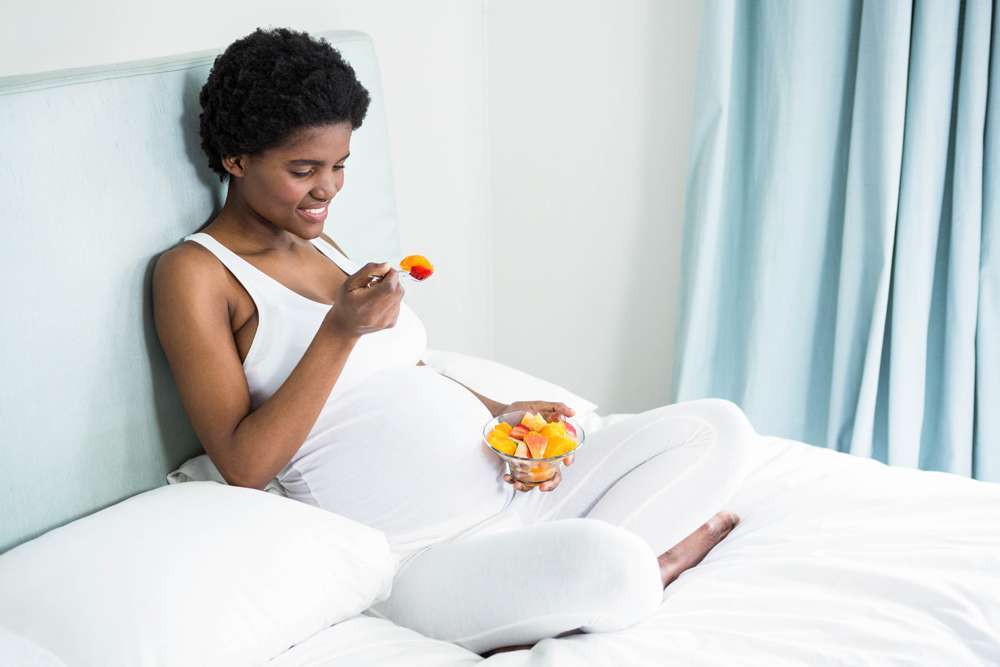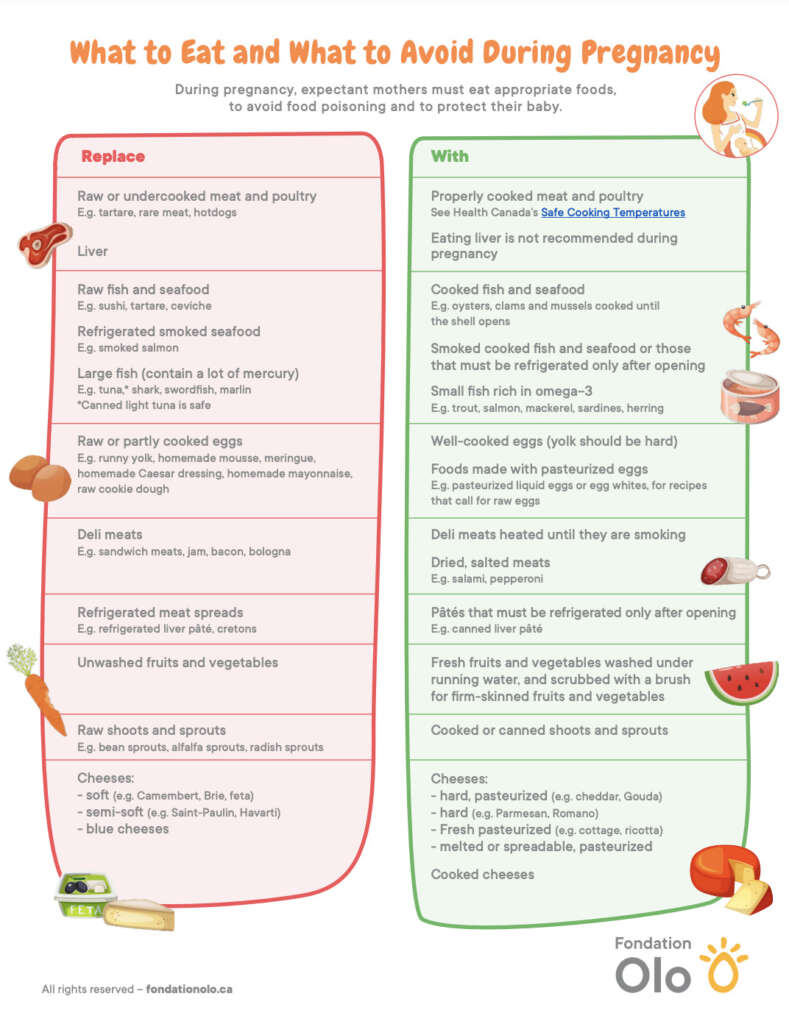Because the fetus is very fragile, an expectant mother must pay close attention to her nutrition during this time. Foodborne infections could harm baby’s health. For that reason, some foods should be avoided temporarily.
Replace… With…
Raw or undercooked meat and poultry E.g. tartare, rare meat, hotdogs
Liver Properly cooked meat and poultry See Health Canada’s Safe Cooking Temperatures Eating liver is not recommended during pregnancy
Eating liver is not recommended during pregnancy
Raw fish and seafood
E.g. sushi, tartare, ceviche
Refrigerated smoked seafood
E.g. smoked salmon
Large fish (contain a lot of mercury)
E.g. tuna,* shark, swordfish, marlin
*Canned light tuna is safeCooked fish and seafood
E.g. oysters, clams and mussels cooked until the shell opens
Smoked cooked fish and seafood or those that must be refrigerated only after opening
Small fish rich in omega-3
E.g. trout, salmon, mackerel, sardines, herring
Raw or partly cooked eggs
E.g. runny yolk, homemade mousse, meringue, homemade Caesar dressing, homemade mayonnaise, raw cookie doughWell-cooked eggs (yolk should be hard)
Foods made with pasteurized eggs E.g. pasteurized liquid eggs or egg whites, for recipes that call for raw eggs
Deli meats
E.g. sandwich meats, jam, bacon, bolognaDeli meats heated until they are smoking
Dried, salted meats
E.g. salami, pepperoni
Refrigerated meat spreads
E.g. refrigerated liver pâté, cretonsPâtés that must be refrigerated only after opening
E.g. canned liver pâté
Unwashed fruits and vegetables Fresh fruits and vegetables washed under running water, and scrubbed with a brush for firm-skinned fruits and vegetables
Uncooked or undercooked frozen vegetables Frozen vegetables cooked according to package directions
Raw shoots and sprouts
E.g. bean sprouts, alfalfa sprouts, radish sproutsCooked or canned shoots and sprouts
Cheeses:
- soft (e.g Camembert, Brie, feta)
- semi-soft (e.g. Saint-Paulin, Havarti)
- blue cheesesCheeses:
- hard, pasteurized (e.g. cheddar, Gouda)
- hard (e.g. Parmesan, Romano)
- Fresh pasteurized (e.g. cottage, ricotta)
- melted or spreadable, pasteurized
Cooked cheeses
Replace these risky beverages With these safe beverages
Raw or unpasteurized milk Pasteurized milk
Unpasteurized juice
Juices that are pasteurized or heated to boiling point
Alcoholic drinks
Kombucha
Energy drinksAlcohol-free drinks
E.g. mocktails, flavoured water, sparkling water
Herbal teas made with:
chamomile, aloe leaves, coltsfoot, juniper berries, pennyroyal, buckthorn bark, comfrey, Labrador tea, sassafras, yellow dock root, lobelia, senna leaves, etc
Herbal teas* made with:
orange and citrus peel, ginger, rosehips
*Drink in moderation (2 to 3 cups per day)
Caffeine
Caffeine should be limited to 300 mg per day. This means 2 cups (500 ml) of coffee or 6 cups of tea per day.
Don’t forget to take into consideration that some foods contain caffeine.
Here are the main sources of caffeine:
- Coffee, 1 cup (250 ml): 100 to 200 mg
- Instant coffee, 1 cup (250 ml): 50 to 100 mg
- 1 espresso, (30 ml): 40 mg
- 1 cup of tea, (250 ml): 50 mg
- 1 can of soft drink, (355 ml): 40 mg
- E.g cola
- 1 cup of chocolate milk, (250 ml): 5 mg
- 1 piece of dark chocolate (45 g): 30 mg
Fish
To help with the baby’s development, it’s recommended that you eat fatty fish twice a week.
Examples:
- Trout
- Salmon
- Mackerel
- Sardines
For a total of 5¼ oz. (150 g) of fish per week.
It can be hard to go without foods you like for 9 months. But after your baby is born, you can make up for it. Anticipation will make you enjoy it even more.
Download our checklist to have all this information at your fingertips!
It is true that it is sometimes heartbreaking to put aside foods enjoyed for 9 months. But, you can recover after the birth of your little one. It is only pleasure postponed!
Writing : Fondation Olo
Scientific review: Mylène Duplessis Brochu, nutritionist, Dt.P., M.Sc.

